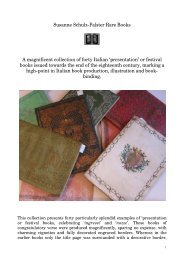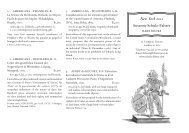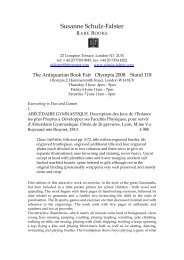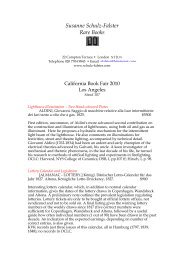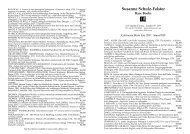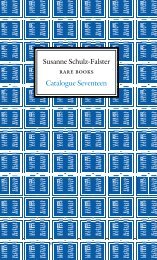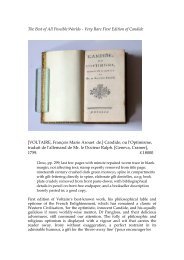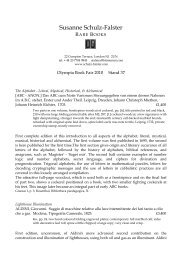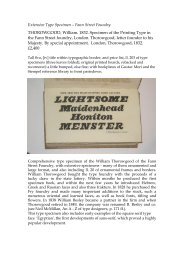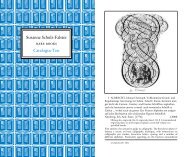Hebrew Printing in Sabbioneta 1 AFFO, Ireneo - Schulz-Falster Rare ...
Hebrew Printing in Sabbioneta 1 AFFO, Ireneo - Schulz-Falster Rare ...
Hebrew Printing in Sabbioneta 1 AFFO, Ireneo - Schulz-Falster Rare ...
You also want an ePaper? Increase the reach of your titles
YUMPU automatically turns print PDFs into web optimized ePapers that Google loves.
First edition <strong>in</strong> French of Kant’s important essay Zum ewigen Frieden (Wrst<br />
published <strong>in</strong> 1795), and presumably the edition <strong>in</strong> which it was read <strong>in</strong><br />
most of Europe. This publication is a clear outcome of the grow<strong>in</strong>g emphasis<br />
and reliance on <strong>in</strong>ternational relations <strong>in</strong> modern politics. Kant, who<br />
knew Rousseau’s Extrait du Projet de Paix perpetuelle, which <strong>in</strong> turn was<br />
based on Castel de Sa<strong>in</strong>t-Pierre’s fundamental work of the beg<strong>in</strong>n<strong>in</strong>g of<br />
the eighteenth century, here details the basis of practical paciWsm. In his<br />
far-reach<strong>in</strong>g analysis of preconditions for the establishment of peace, Kant<br />
anticipates twentieth century developments, such as the League of Nations<br />
and the United Nations Charter. ‘The social order that Kant recommended,<br />
based as it was on his analysis of man’s nature, would permit a maximum<br />
of <strong>in</strong>dividual freedom and competition, yet would have enough power<br />
to restra<strong>in</strong> this freedom whenever it threatened to produce oppression or<br />
anarchy. He proposed a similar system for <strong>in</strong>ternational aVairs; each separate<br />
state should be free to run its own aVairs, but a supranational federation<br />
of sovereign states would have enough power to regulate <strong>in</strong>ternational relations<br />
and prevent war’ (IESS).<br />
This Wrst French edition is of importance <strong>in</strong> its own right, s<strong>in</strong>ce it actually<br />
conta<strong>in</strong>s a second supplement not <strong>in</strong>cluded <strong>in</strong> the orig<strong>in</strong>al German edition<br />
of the previous year. The additional Article secret pour la Paix perpétuelle, was<br />
later repr<strong>in</strong>ted <strong>in</strong> the second German edition. Here Kant recommends that<br />
the authorities of the state should consult the philosophers on the questions<br />
of peace or war. No <strong>in</strong>formation on the identity of the translator is<br />
available. It seems evident however that it was not by Kant himself, as the<br />
translation is not particularly faithful, some of the footnotes have been cut,<br />
others left out.<br />
Not <strong>in</strong> Warda, see Warda 154 for Wrst edition.<br />
From Samuel Grubbe’s Library<br />
65 KANT, Immanuel. Über Pädagogik. Herausgegeben von<br />
D. Friedrich Theodor R<strong>in</strong>k. Königsberg, Friedrich Nicolovius,<br />
1803. £650<br />
8vo, pp. vi, 146; entirely uncut <strong>in</strong> contemporary boards, sp<strong>in</strong>e partially<br />
lettered <strong>in</strong> manuscript; extremities a little bent, else a Wne and crisp;<br />
from the library of the Swedish philosopher Samuel Grubbe.<br />
First edition of Kant’s only speciWc contribution to educational theory.<br />
Kant, as professor of Logic and Metaphysics at Königsberg also had to<br />
lecture on subsidiary subjects, such as education. He handed his lecture<br />
notes to his friend, Theodor R<strong>in</strong>k, and they were Wnally published <strong>in</strong> 1803,<br />
a year before Kant’s death.<br />
This brief treatise, <strong>in</strong> itself not a systematic study of educational theories<br />
but a collection of thoughts and maxims, shows Kant strongly <strong>in</strong>Xuenced<br />
by Rousseau’s Emile. Just like Rousseau he writes about ‘education accord<strong>in</strong>g<br />
to nature’, but stresses that children should be treated as children and<br />
not as adults <strong>in</strong> m<strong>in</strong>iature. Accord<strong>in</strong>g to Kant ‘man’ is the only creature<br />
catalogue fourteen



